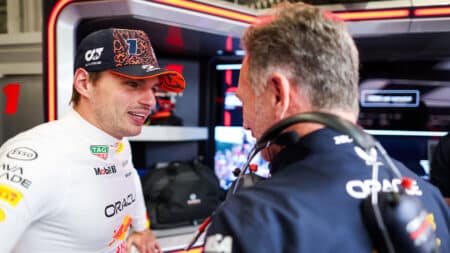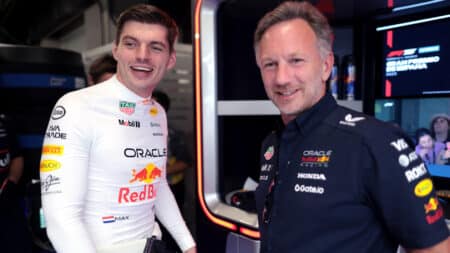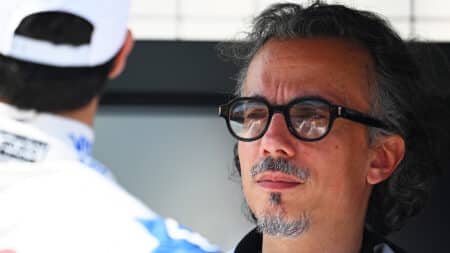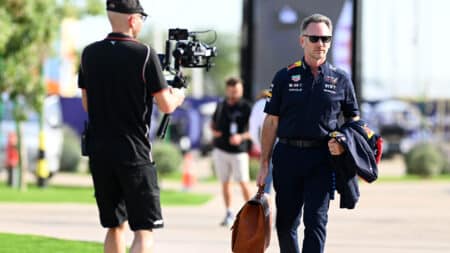
Max Verstappen reacts to Christian Horner's Red Bull F1 exit
Max Verstappen has now had his say after Red Bull confirmed his former F1 boss had left the team
The handbagging afters between Sebastian Vettel and Narain Karthikeyan in Malaysia were pure sanitised Formula 1: nothing more savage than a sound bite or two. Idiot. Crybaby. Hardly bare-knuckle.
Neither man was free from fault in the trigger incident: Karthikeyan dozily drifted a mite right – having gathered up a moment over a slickery kerb – as Vettel skimmed an obstacle that, in his own mind, had already been dealt with. Summarily.
And therein lies the reversed-logic problem: nowadays, backmarkers are hardly an obstacle. Pass three successive blue flags without sufficient supplication being shown and they receive a pit-to-car flea in their ear and some form of penalty – and probably a letter of censure from Kofi Annan. Expected to jump, preferably leap, out of the way, they usually do. That’s why the frontrunners, in the manner of a lorry driver with a cyclist, cut them no slack. Whack!

I am not advocating a return to the bad-old-good-old days, but I will admit to a sneaking regard for the Obstreperous Backmarker of yore. Who am I kidding? I miss ’em. Racers of Thatcher, at least you knew where you were with them: on your own, fending for yourself. Openly derided in paddock and pit lane, they had to be awarded grudging respect on the track: Caution! Wide load.
The French were rather good/bad at it, usually in a Ligier.
Tempestuous Guy Ligier (below) is a tough nut that butted heads as a rugby union B-international hooker in the days before video refs. Fatherless from an early age, his first major vehicular purchase was a bulldozer upon which a construction empire was cussedly founded. He raced bikes, then cars – determinedly rather than out-and-out quickly – and achieved the dream: F1 in 1966-’67, as a privateer in a Cooper, then a Brabham.

He returned to F1 in 1976 as a team owner, with Jacques Laffite at the wheel of a patriotically blue car bedecked by a quintessentially French sponsor: Gitanes. ‘’Appy Jacques’ doesn’t have a nasty bone in his body and his freewheelin’ attitude – allegedly he once had to re-hail a cab after removing his fishing rod and tennis racquet but not his crash helmet from its boot – provided a counterpoint to his volcanic boss. They rubbed along just so, a relationship no doubt salved by Laffite’s winning of six of the team’s eventual tally of nine Grand Prix victories.
Things changed when Laffite jumped ship for Williams for 1983. Ligier slumped – but went down blocking. I doubt that there was an official directive, but it seemed clear that Guy’s guys were not employed to be in the business of opening the door for anybody at anytime, rather to ruck and maul.
That Jean-Pierre ‘Jumper’ Jarier was Laffite’s replacement set the tone. His ‘Sorry, mate, didn’t see ya’ performances caused the incorrigibly incorrect James Hunt to rewrite several unwritten broadcasting rules.

The next ‘Frenchie’ to register 11 on the industry-standard Hunt-ometer was René Arnoux (above), who joined Ligier in 1986. Unlike Jarier, who had the talent but not the application and, therefore, rarely the opportunity, ballsy Arnoux was a proven winner at the highest level. Mere haplessness – think Eliseo Salazar of Nelson Piquet heel-of-hand/toe-of-boot fame – is insufficient. Chip-on-shoulder bloody-mindedness and the couldn’t-care-less (preferably Gallic) shrug of a fading star are required for full-on backmarker devilment.
Actually Arnoux, dumped by Ferrari in 1985 after just one race, made a good fist of restoring his career in that first season with Ligier: 11 top-10s in qualifying, three fourths, two fifths and a sixth. But Ligier’s deal to run Alfa Romeo’s no-go turbo four-pot, and Arnoux’s brutally honest opinion of it, left the team in the lurch in 1987, and he and it slid remorselessly down the grid and lap chart, first with Megatron, then Judd, then Cosworth power.
René, God bless his Nomex socks, had always been an outsider looking in – this is the racer who felt no need to paint his crash helmet because doing so would not make him faster – and he had no compunction about making a pest of himself during his last two seasons. Hunt went apoplectic.

And then Olivier Grouillard (above), another uncompromising competitor from France’s rugby heartland, and a frontrunner in F3000 to boot, joined Arnoux for 1989. Block-a-chock. He arrived in F1 bright-eyed and bushy tailed – and scored a point at home. By the time he had been through the run-of-the-mill at Osella, Fondmetal and AGS, however, he had proved beyond all doubt that he had absorbed the Ligier/Arnoux ‘spirit’. During his 1992 season at Tyrrell, he was considered a genuine menace.
Still unconvinced? Ligier also employed Andrea de Cesaris, Philippe Alliot and Piercarlo Ghinzani, none of who were renowned for the width of their peripheral vision.
My point? Vettel has it easy in this regard. His reaction in Malaysia said more about his state of mind than the state of F1’s rules of engagement. Blessed with talent and a sense of humour in the main, he does tend to whinge when he’s not winning. Which, to be fair, hasn’t been often in recent times.
In contrast, Jenson Button shrugged off his cock-up that skewed his McLaren’s front wing against Karthikeyan’s left-rear Pirelli at Sepang – they were jostling, no more, for position at the time. By any measure, this is a better way to deal with the modern-day makeweight make-ways. Button’s was a far classier nought than Vettel’s. By such ‘margins’ are titles won. And lost.

Max Verstappen has now had his say after Red Bull confirmed his former F1 boss had left the team

Christian Horner's Red Bull team developed an F1 car that only Max Verstappen can race successfully and now he's had to carry the can, says Karun Chandhok

With the sudden departure of Horner, Red Bull faces a pivotal crossroads as it navigates the future of its Formula 1 team and leadership

Christian Horner's dismissal well and truly marks the end of a wildly successful era for Red Bull. Mark Hughes examines how the team started to crumble